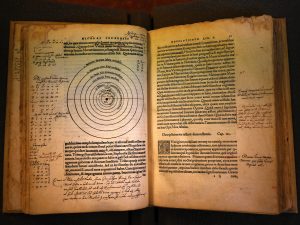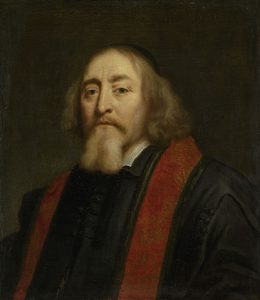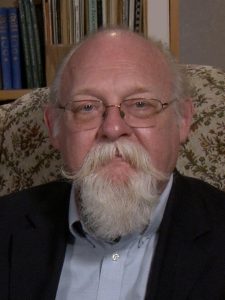Comenius, Copernicus, and Concerned Moravians
by the Rev. John Jackman
It may come as a surprise to most Moravians that Bishop John Amos Comenius, who would later be known as the “Father of Modern Education,” was the owner of the actual original hand-written manuscript of Copernicus’ historic treatise, De Revolutionibus Orbium Coelestrum. It was in this document that Copernicus proposed the radical (and controversial) new idea that the earth revolved around the sun rather than that the earth was the center of the universe. But what may be even more surprising to many modern Moravians is that Comenius didn’t believe Copernicus’ theory. However, he believed so deeply in academic freedom and the debate of ideas that even as a relatively poor student he used what little money he had inherited from an aunt to buy the manuscript to keep it from being burned by the Roman Catholic Church.

I should pause for a moment to mention that at this time, there was some good justification for Comenius’ rejection of Copernicus’ ideas. In the early 17th century, those ideas were still not widely accepted. Copernicus postulated that the orbits of the planets around the sun were perfect circles, which did not always match up with actual observations, and required even more fudges and adjustments than the old Ptolemaic theory. There were major scientific questions which the theory did not answer, and so during Comenius’ lifetime many astronomers and academics still believed in some form of geocentric universe. Johannes Kepler, who realized that the orbits of the planets were actually elliptical, had only recently published his ideas – and they were not widely accepted yet either. Newton’s theory of gravity, which explained why the orbits worked the way they did, and essentially provided the answers that made the Copernican theory work, was still almost seventy-five years in the future. I like to think that if Comenius had lived longer, he might have changed his mind as he learned more.
[perfectpullquote align=”left” bordertop=”false” cite=”” link=”” color=”” class=”” size=””] Comenius believed that the Bible was the supreme authority of all knowledge. [/perfectpullquote]But he might not have, in spite of mounting scientific evidence that Ptolemy’s ancient Greek concept of the universe was simply wrong. Comenius believed that the Bible was the supreme authority of all knowledge, including scientific knowledge, and he held to this belief his entire life. And it seemed that the Bible supported geocentric view. However, at the same time, he believed deeply in pursuing scientific research and wide-ranging academic debate. He saw the study of nature as a way to study the mind of the Creator. I do not know how Comenius would have reacted to the science that emerged after his lifetime – what he would have thought of electricity, of nuclear power, of human flight, of the theory of evolution.
As a young man I was fascinated with both science and the Bible, and at first found many creative ways to reconcile the two. I bought a number of books that sought to prove that the Bible foreshadowed many scientific discoveries. However, as I continued to study both intently, the ideas these books presented seemed less and less reasonable. Often they used convoluted arguments that depended on a particular word in the King James Version – and when I learned to check what the actual Hebrew or Greek word was, the whole argument fell apart. It wasn’t long before I came to the understanding that the Bible was not intended to be a science book – or a history book.
Why is this important today? It is important today because the same argument rages on. In our divided nation, there is no greater division than between one set of Christians who believe in a literal interpretation of the Bible and other Christians who see the Bible as a profound spiritual guide – and seek to follow Jesus without slavishly trying to prove that every word of Scripture is somehow scientifically “true.” Nowhere is this divide more evident in all denominations – including the Moravian Church – than in the discussion of same sex marriage.
Since the 2018 Southern Province Synod seemed to open the possibility of same sex marriage and ordination of gay persons in the Moravian Church, a group has emerged calling themselves “Concerned Moravians.” I know and care about many people who are in that group, and have no wish to pick a fight with them or misrepresent what they believe. I encourage the reader to go visit their site at www.concernedmoravians.org and read for themselves what the concerns and claims are.
[perfectpullquote align=”right” bordertop=”false” cite=”” link=”” color=”” class=”” size=””] Is the Bible “true” in a different and deeper sense, conveying deep spiritual truth in parable and poem while not ever intending to be a science manual or history book? [/perfectpullquote]
Of course, Concerned Moravians is not the first such group. A similar group formed in the Northern Province a few years back, and twenty years ago there were groups which left the Moravian Church over earlier versions of these issues. A century ago, there were people who opposed any teaching of the theory of evolution in the Moravian Church. In some ways, the actual issue behind these various groups has been the same: is the Bible “true” in the simplistic sense that it is a perfectly accurate and infallible textbook of science and history? Or is it “true” in a different and deeper sense, conveying deep spiritual truth in parable and poem while not ever intending to be a science manual or history book? What happens when modern science and the Bible appear to be at odds? How do we decide thorny issues of our day? With snippets of Scripture taken out of context? Or using the entire gift of knowledge guided by Scripture?
The fact is that the various books of the Bible were not written to be read in “snippets.” The Book of Romans, for example, was not divided into chapters and verses when Paul wrote it. It was written as a single whole letter, intended to be read to the church as a whole. In many places, major ideas are placed in tension with other major ideas, and they must be taken together in context. You cannot read chapter one by itself without immediately reading chapter two – chapter two completely overturns some of the ideas presented in the first chapter. But we’ve gotten in the habit of treating the Bible like a fortune cookie – little bumper sticker aphorisms – and lost the challenging art of reading long passages in context. As valued and meaningful as our Moravian Daily Text is, its use over the centuries has probably reinforced this “bumper sticker” approach to the Scriptures.
Reading only Romans 1:26-27 (one of the familiar “clobber verses” often quoted to establish that homosexuality is a sin) out of context while ignoring the rest of Romans is rather like claiming that “Jesus said, “‘You should love your neighbors and hate your enemies’.” Yes, he did say that – but immediately followed by “But I say to you, Love your enemies and pray for those who persecute you.” Quoting out of context like that does violence to the true meaning and significant intent of the Scriptures. Because in Romans, Paul goes on to say “Therefore you have no excuse, whoever you are, when you judge others; for in passing judgement on another you condemn yourself, because you, the judge, are doing the very same things” (Romans 2:1, NRSV).
I was saddened recently to receive a thick, glossy-covered book printed by the Concerned Moravians called “Moravian Voice: Statements of Faith.” I was saddened because it was so intensely one-sided and inaccurate, slanted very heavily to express one particular point of view, without even a tip of the hat to other views.
One article claimed to present “contemporary medical knowledge” on the issue of same-sex marriage. The information citations came solely from the “Association of Christian Medics in the Czech Republic,*” apparently a group of evangelical/charismatic medical folks who already share the author’s views. The information cited is extraordinarily biased and limited to statements that would support anti-gay views. The author completely ignores the large swathes of recent medical and genetic research that has brought greater understanding of sexual preference and identity. Many of the interpretations and applications of Scripture would be disputed by scholars, as well.
[perfectpullquote align=”left” bordertop=”false” cite=”” link=”” color=”” class=”” size=””] You can make any kind of argument if you choose in advance to ignore any evidence that doesn’t fit your theory. [/perfectpullquote]The problem is, you can make any kind of argument if you choose in advance to ignore any evidence that doesn’t fit your theory. I can put together a pretty good argument that the world is flat, or that there is actually a bowl separating the waters above the sky, or that God approves of slavery, by using the same approach.
Are going to have a genuine discussion about these issues? Or are we going to insist on enforcing a fundamentalist “Biblical world view” that uses arbitrary literal rules for interpreting Scripture and ignores any contemporary knowledge that doesn’t match with preconceived conclusions? Or even worse, ignore glaring contradictions within Scripture itself, or serious problems with translation?
Concerned Moravians recently ran an ad in the Winston-Salem Journal promoting a gathering: “Like-minded people are invited to a meeting of the Concerned Moravians to hear an address: ‘Moravians In Crisis – A Call to Action.’” The ad included a banner: “It’s time for dialogue!”
But we already had dialogue – a great deal of dialogue! We spent a great amount of energy and time during the 2014-2018 intersynodal period having such dialogue. I was one of the table facilitators, I participated in almost every one of the meetings at various churches.
People of all points of view were invited to share their ideas. Many points of view were also present at the 2018 synod, and far from being “silenced,” they were allowed to speak over and over and over again – usually reiterating the same narrow points and ignoring the other viewpoints that were represented. When the Synod voted, a 2/3 majority voted to leave the door open for same-sex marriage and for ordination of gay folks in active relationships, making no changes – zero – to the traditional areas of authority in decision- making viz. Provincial Elders, local church board, and pastor. The arguments that were presented by those opposed were rejected by the majority. That doesn’t mean they were “ignored” or “silenced” – that means that their arguments failed to convince. And I haven’t heard anything new lately.
I for one will be glad to have more dialogue on the issue – but that means we must have genuine dialogue, not power plays, pep rallies, bullying, or politics. In so many of the conversations I have had with different Moravians on the subject, sadly I have to say that most of them were not “dialogue” or true discussion at all. Most of the time, they were deaf to any other interpretation of the famed “Six Clobber Verses,” unwilling to even look at contemporary science and medical knowledge, unwilling to consider any viewpoint but their own. That is not dialogue. One argument that I heard over and over was “That’s not what granddad taught me.” Well, my grandad was a well-educated Methodist minister who spoke five languages fluently, and (to be frank), he would certainly have sided enthusiastically with the Concerned Moravians. I still hold deep respect and love for him, but he was wrong on many issues. The arbiter of faith and following Christ is not enshrining what granddad said – that’s idolatry. Another common argument was even shallower and insulting: “Read your Bible!” – as if I have not dedicated my entire adult life to reading and understanding the Bible, including learning about the original languages and studying the history deeply.
At a recent public meeting of the Concerned Moravians, the statement was made that it was a “principle” that anyone could interpret the Bible – you needed no education or training.
This is a teaching of 20th Century fundamentalism, not the Moravian Church. The Moravian Church has always placed a very high value on education and learning. Hus studied philosophy before becoming ordained; John Amos Comenius had a doctorate and had studied widely. Count Zinzendorf acknowledged that to understand difficult passages of the Scriptures, we needed to use the “tools” – knowledge of the original languages and historical knowledge of the times. The Moravian Church is not, and has never been, a “fundamentalist” or “literalist” church. Those who would reshape it in that 20th century mold are very mistaken.
One thing I have learned from these conversations – and from hearing the wild statements and conspiracy theories during the COVID pandemic – is that most folks did not pay much attention in high school science, and have paid even less attention to advances in science since then. The current science on sexual preference and transgender issues is considerable and has revealed many complexities that go far beyond X and Y chromosomes. Brain scans have revealed that brain development can take an entirely different direction than the outward sexual organs. The simplistic black-and-white arguments ignore the regular occurrence of intersex births. I have yet to hear a discussion where the contemporary science is seriously considered.
[perfectpullquote align=”right” bordertop=”false” cite=”” link=”” color=”” class=”” size=””]Perhaps if science seems to be at odds with the Bible, it is actually your understanding that falls short – not the Bible or the science.[/perfectpullquote]In fact, in most cases, the science – and the facts – seem to be irrelevant to this discussion. A literalistic “Biblical Worldview” based on fundamentalist theology of the last century seems to be the driving factor. And in fact, it is not really “what the Bible says” at all in most cases. It is the enshrinement of “What I say the Bible says,” which is actually a very different thing. Alternate readings or understandings are dismissed out of hand and not considered. But over the years of wrestling with the Bible, the various translations, and the original languages, I have found in many places that my initial and immature concept of what the Bible said were simply wrong — and I have had to revise my understanding. As science advances and we learn more about God’s creation, I have often had to go back and reconsider my understanding of specific Scriptures. In short, the more I learn, the less I know – and the less certain I am of my own opinion – but the more certain I am of God’s grace. Perhaps if science seems to be at odds with the Bible, it is actually your understanding that falls short – not the Bible or the science.
But in fact these folks are carrying forward an historic Moravian view that Comenius shared – that the Bible was the “supreme authority of all knowledge.” We ought to address this. They are insisting, they say, that we must put the Bible first. But are they really? Or are they insisting on their own particular interpretation of various verses, while ignoring many other legitimate teachings in the Scriptures? In fact, most of us ignore large swathes of inconvenient Scriptures, items which range from not eating shrimp to not wearing mixed fabrics to not charging interest on loans. Or those annoying verses about “turning the other cheek” and “loving enemies.” When was the last time you heard an evangelical Christian talking about a modern Year of Jubilee – forgiving all debtors? That’s Biblical!
Insisting that a particular single verse in Deuteronomy is vital, while stubbornly ignoring inconvenient passages in the next chapter, seems not to display that rigor that should be expected from those who claim to put the “Bible first.”
But there is a deeper issue here. The fact is that Comenius was wrong about the earth being the center of the universe. He was right about many other things. A century later, Zinzendorf was wrong about slavery – even though he was right about many other things. Sadly, there are many other important areas where we Moravians have been wrong as well. And we were misled in many cases by placing a snippet of Scripture – or a peculiar interpretation of it – above the evidence of our eyes and minds and hearts, even when the Holy Spirit was tugging and pushing us to new ground. In other cases, we let pressure from the surrounding culture overwhelm our inspired and Biblically-based practices.
Jesus said that the greatest commandment was to love the Lord our God with all our heart, soul, and mind. Galileo Galilei (who was of course a major figure in that revolutionary Copernicus discussion) said, “I do not feel obliged to believe that the same God who has endowed us with sense, reason, and intellect has intended us to forgo their use.” In fact, abandoning rational thought and observation in favor of a mindless parroting of what some previous generation said a particular verse meant – is not loving God as we are called to do.

It is my fervent hope and belief that if Comenius had lived to hear the evidence piling up for a heliocentric solar system, that he would have changed his mind on the subject. But whatever Comenius might have thought, we know one thing clearly: he felt that all points needed to be freely discussed and considered, even radical new ideas that the institutional church labels as “heretical.” He was willing to put his substance on the line to prevent Copernicus’ manuscript from being burned – even though he didn’t believe in it!
Two centuries before Comenius, Jan Hus stood before the Council of Constance and demanded proof – not blind obedience to authority. He stood for truth, his motto was that “Truth prevails.” He was labeled an arch-heretic and burned at the stake. But the truth will prevail. I believe that in this discussion, we have the opportunity to hear where the Holy Spirit is calling the Moravian Church. We have moved past an antiquated and fallacious idea of the universe; we have moved beyond an unthinking acceptance of slavery; we are now at a point to move forward and live out the vision of Peter: “Do not call anything impure that God has made clean.” (Acts 10:15, NIV)
 The Rev. John Jackman is a Moravian pastor, author, and filmmaker. He is currently pastor of Trinity Moravian Church in Winston-Salem, NC. He lives out in the woods in Lewisville with his wife Debbie, daughter Abby, two cats, and six ducks.
The Rev. John Jackman is a Moravian pastor, author, and filmmaker. He is currently pastor of Trinity Moravian Church in Winston-Salem, NC. He lives out in the woods in Lewisville with his wife Debbie, daughter Abby, two cats, and six ducks.
* I have not been able to find any reliable information on the internet about this group or its bona fides.
Featured photo: The Copernican model from the Harmonica Macrocosmica atlas by Andreas Cellarius.




This is a test of comments